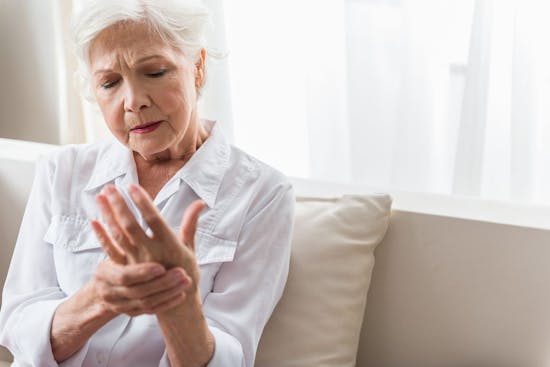
What is Arthritis?
Arthritis is inflammation of one or more of your joints that causes stiffness, swelling and tenderness. There are more than 100 types of arthritis. So, symptoms can vary widely depending on what type of arthritis you have and how severe it is.
Two of the most common types of arthritis are osteoarthritis (OA) and rheumatoid arthritis (RA). They both involve the breakdown of cartilage, but the cause of the breakdown is different.
- Osteoarthritis is a disease that typically involves age-related wear and tear of the cartilage that slowly progresses over many years before joint damage begins. Although, infection or injury can speed up the natural breakdown of cartilage. An estimated 27 million Americans are affected by OA.
- Rheumatoid arthritis is a disease of the synovium that mistakenly invades and destroys joints in the body, which can eventually cause the destruction of the bone and cartilage inside the joint. Most people with RA start developing joint damage within 2 years. But, some people may start experiencing joint damage as early as 3 months after the onset of RA symptoms. Approximately 1.5 million U.S. adults have RA.
Who Can Develop Arthritis?
Arthritis is a very common condition that affects over 3 million Americans of all ages per year. Even children develop arthritis, including newborns. Genetic markers in your family history can increase your risk of developing arthritis.
Physical Therapy Can Help
Physical therapists (PTs) are experts in the art and science of the evaluation and treatment of human movement dysfunctions. We care for people of all ages and treat a variety of muscle, joint and neurological conditions.
Conditions we have successfully treated:
- Joint Pain
- Osteoarthritis
- Rheumatoid Arthritis
- Knee Arthritis
- Hip Arthritis
- Shoulder Arthritis
- Hand Arthritis
What are my treatment options?
- Drugs
- Epidural Injections
- Surgery
- Physical Therapy*
Advantages of Physical Therapy:
- No side effects.
- Cost-effective.
- Supported by clinical research*.
- Customized to treat the underlying cause.
Your Recovery Process:
- Recovery of Joint Motion
- Recovery of Strength
- Pain Relief
- Improved Function
- Independent Care
Components of Your Care:
- A thorough biomechanical evaluation.
- Extensive patient education.
- A customized treatment plan.
- Effective joint mobilization techniques to decrease joint stiffness.
- Pain-relieving modalities such as ice, heat, ultrasound or electrical stimulation.
- Targeted stretching for tight muscles.
- Progressive strength training.
- Balance and functional re-education.
Everyone is different. You may require one or two visits or an extended care plan over several weeks or months. If you’re ready for relief, and tired of “masking” your pain, treat the cause, not just the symptoms!
* Physical therapy techniques are recommended for arthritis of the knee, hip, shoulder, and hand. Physical Therapy 2005 85: 907-971; Physical Therapy 2004 84: 934-972.
